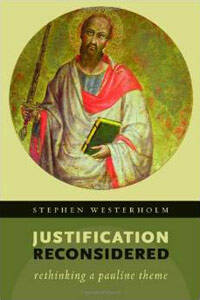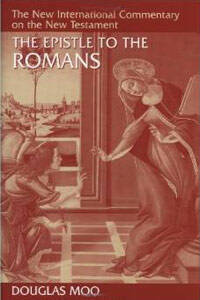If humanity is incapable of rendering the obedience that the law—whether natural or revealed—demands, then how can humanity be saved from God’s holy wrath against their sin and the eternal consequences thereof? How, in other words, can humanity find a gracious God when it simply deserves divine wrath and condemnation?
Enter in the doctrine of justification by faith alone and the genius of the traditional interpretation of Paul. God “justifies the ungodly” (Rom. 4:5). “Christ . . . died for the ungodly” (Rom. 5:6). “Since we have been justified by [Christ’s] blood, we will be saved from [God’s] wrath” (Rom. 5:9).[1] But how can this be—a holy and righteous God who justifies the ungodly, who declares his own enemies to be innocent and having the status of righteousness? Is this not simply a legal fiction? And does this not render God to be an unjust and capricious judge, a judge who overrides his own perfect justice and fails to exact the penalty for sin?
status of righteousness? Is this not simply a legal fiction? And does this not render God to be an unjust and capricious judge, a judge who overrides his own perfect justice and fails to exact the penalty for sin?
Traditional interpreters will respond to these charges with a resounding “No!” and will undoubtedly marshal Romans 3:25–26 as their crown jewel in response.[2] God both justifies the sinner and is simultaneously just in doing so because Christ has made atonement for sins and thereby absorbed God’s wrath. In other words, God’s justice is satisfied—or “demonstrated” (twice in Rom. 3:25–26)—precisely in overlooking humanity’s sins by redirecting his punishment to his own Son. This reading is tied to a particular substitutionary view of the function of sacrifice. Key Pauline vocabulary such as “propitiation” (Rom. 3:25), “blood” (Rom. 3:25; 5:9), and “sin offering” (Rom. 8:3) are used as evidence to indicate how Christ’s death functions in substitutionary terms such that God condemns the sin of humanity in Jesus’ sacrificed body on the cross. So we see how the paradox works: God can justify sinners since their sin and its consequences have been absorbed in the crucified Christ. Westerholm states this clearly and passionately: “God allowed human sinfulness to spend all its force on the suffering Christ until, drained of all evil, it was ‘expiated’ and exists no more. Their sins done away with, there is no miscarriage of justice when erstwhile sinners are declared ‘righteous.’”[3]
But what is meant by the language of justification? It is certainly not every-day language for most of us. Moo succinctly helps us here in his claim that justification refers to “the status of acquittal acquired by the person so declared just.”[4] The language of justification is, on this view, forensic and legal as indicated by the language of status, acquit, and declare. Appeal is made to how the Old Testament employs justification language in a law-court setting where, as Moo notes, Israel’s judges are called to “justify the just and condemn the ungodly” (LXX Deut. 25:1).[5] Thus, the judge does not make someone righteous; the judge simply provides a legal declaration or renders a verdict regarding what is already the case. For the person who believes in Christ, therefore, to be justified “means to be acquitted by God from all ‘charges’ that could be brought against a person because of his or her sins.”[6] Paul’s controversial phrase “the righteousness of God” (see Rom. 1:17; 3:5, 21–22, 25–26; 10:3; 2 Cor. 5:21; Phil. 3:9) is, for Moo, simultaneously God’s activity to save and vindicate, as well as “the status of those who are so made right, in a relational sense that bridges the divine and the human.”[7] Pure and simple, “the righteousness of God” is “the act by which God brings people into right relationship with himself.”[8]
Again, this justification is something that is entirely forensic, meaning that it is an act of acquittal and not a transformation of the person. Here interpreters often point to those Pauline texts that use the language of imputation or crediting. God takes a righteousness that does not belong to or originate with the individual, namely, the perfect righteousness of Christ, and credits or imputes this righteousness to the believer (e.g., Rom. 4:2–8; Gal. 3:6). The statement that has the clearest purchase on this view of the matter is 2 Corinthians 5:21—“He who knew no sin became sin, so that in him we might become the righteousness of God.” In other words, by virtue of humanity’s union with Christ “the sinfulness of human beings was made Christ’s, so that his righteousness might be made theirs.”[9] Since believers really are united to Christ, this situation is not a legal fiction, for the righteous status of Christ actually is their righteousness.
God’s justification of the individual is clearly a matter of grace, and traditional interpreters note the numerous places in Romans and Galatians where Paul speaks of God’s justifying verdict as unmerited and gracious (e.g., Rom. 3:24; Gal. 2:16; 3:6–9; Eph. 2:8–9). Moo’s statement will strike most as familiar: “One could almost say that ‘the grace of Christ’ summarizes the argument of the letter [i.e., Galatians]. God has decisively manifested himself in Christ, thus sidelining the law, and his saving work in Christ, is completely a matter of grace, to which humans can respond only with faith, not with works of any kind.”[10]
is completely a matter of grace, to which humans can respond only with faith, not with works of any kind.”[10]
We have seen in the previous post that, for Moo and traditional readers of Paul, Paul’s negation of “works of the law” as a possibility for justification can be abstracted into an unrelenting critique on humanity’s capacity to do anything that might merit or contribute to their salvation. And not only is this simply an impossible task, but it would also mean that justification is not “according to grace” (Rom. 4:16). All God asks, then, is that humans respond to the good news with faith in Christ (Rom. 3:28; Gal. 2:16). Paul’s repeated correlation between “righteousness” and “faith” demonstrates that righteousness is a gift for those who believe and that justification cannot be appropriated through the false path of works done in obedience to the law (see Rom. 1:17; 3:21–22, 26; 4:2–8; Gal. 2:16; 3:6). It is crucial to note that the traditional interpreters do not see Paul’s view as overriding the witness of the Old Testament, for Paul himself declares that “God’s righteousness has been revealed apart from the law being attested unto by the law and the prophets” (Rom. 3:21). Thus, Habakkuk 2:4 indicates “the just by faith shall live” (Rom. 1:17; Gal. 3:11), and through “Paul’s interpretation of Gen. 15:6, Abraham is wrested from the Jews as an exemplar of Torah-obedience and made into an exemplar of faith. As a result, Abraham ceases to be for Paul the father of Jews exclusively but the father of all who believe.”[11]
Pauline Theology: A Brief Review of the Traditional Position
Since the next two posts will set forth Campbell’s revisionist response, let me summarize the key components of the traditional interpretation.
- The traditional interpretation, evident by the texts cited above, privileges Romans and Galatians as the fullest expression of Paul’s theology and articulation of salvation.
- Paul’s thinking works from plight to solution. That is to say, Paul does not say who Christ is and what he must do until he has already established and predetermined the universal problem that confronts humanity.
- God’s holiness and justice demand that humanity must fulfill the entire law perfectly in order to be justified before this righteous God.
- But, since all of humanity is sinful and unable to do what God’s character dictates, God’s wrath abides on all people.
- God provides his own Son, who is perfectly righteous, to die for humanity and thereby bear the burden of humanity’s sin, namely, God’s righteous wrath.
- Christ’s righteousness is gifted (or imputed) to the believer such that she now has a righteous status before God and is both presently justified and can expect total acquittal at the last judgment.
- This is purely a matter of grace that comes to the believer by faith and not works.
This reading does not reject the witness of the Old Testament but rather shows how even Israel’s scriptures foretold that God would justify both Jews and Gentiles by faith.
[1] See here, Stephen Westerholm, Justification Reconsidered: Rethinking a Pauline Theme (Grand Rapids: Eerdmans, 2013), 69-71.
[2] Thomas R. Schreiner, “Paul: A Reformed Reading,” in Four Views on the Apostle Paul (ed. Michael F. Bird; Grand Rapids: Zondervan, 2012), 19-47, here, 34.
[3] Westerholm, Justification Reconsidered, 70.
[4] Moo, The Epistle to the Romans, 222.
[5] Moo, Galatians, 50.
[6] Moo, The Epistle to the Romans, 227.
[7] Moo, The Epistle to the Romans, 74.
[8] Moo, The Epistle to the Romans, 74.
[9] Westerholm, Justification Reconsidered, 70.
[10] Moo, Galatians 30.
[11] Moo, The Epistle to the Romans, 256.








Comments
Be the first one to make a comment!